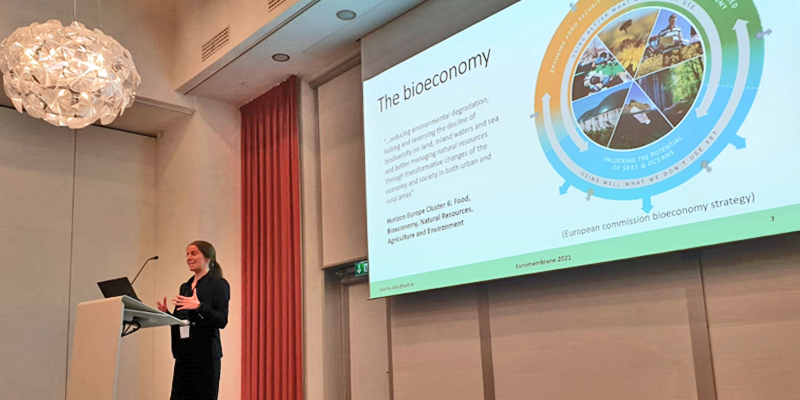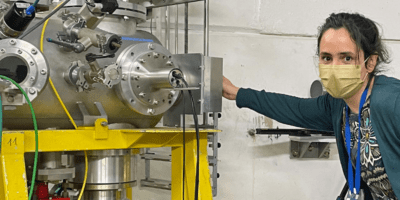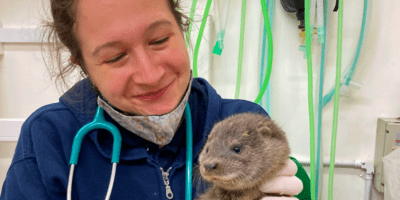Sorcha Daly is a postdoctoral researcher working at University College Dublin (UCD) School of Chemical and Bioprocess Engineering, and BiOrbic, Ireland’s national bioeconomy research centre. Sorcha is a speaker at Soapbox Science Dublin, taking place at South King Street in Dublin City Centre on 18th June 2022. The title of her Soapbox talk is “Reduce, Reuse and Redefine Waste for a Sustainable Future” and in it she will discuss converting whey permeate, a typical ‘waste’ from the dairy industry, into lactic acid which can then be converted into biodegradable plastic.
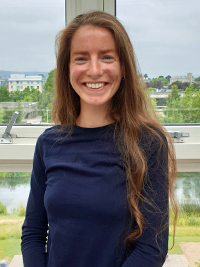
“Our planet is facing many challenges but there is so much encouraging research out there.”
Becoming a chemical engineer in the bioeconomy
As a child, I never knew what I wanted to do when I ‘grew up’ and I wished I could be a stay-at-home daughter forever. In school, we learned a wide range of subjects and I really enjoyed learning almost everything. This made it difficult for me to think about a future career.
Once the time arrived for me to decide what I should study in college I really struggled with my decision. I eventually chose engineering at University College Dublin (UCD) because the first year involved studying every possible engineering discipline before specialising in one discipline in the second year. This delay gave me some breathing space to truly decide what I wanted. I eventually chose to study chemical and bioprocess engineering, although I really enjoyed every discipline.
Throughout my undergraduate course, doing a PhD was always in the back of my mind. I was inspired by my lecturers at UCD and I liked the learning environment. I incorrectly thought that you had to be extremely gifted and intelligent to do a PhD so applying felt like a long shot.
I was so surprised when I got the opportunity to study for a PhD in unconventional water treatment at University of Edinburgh. Our environment is something that I have always been passionate about so it was great to work on such an important project. Despite many challenging setbacks, I finally received my PhD after five years.
When the opportunity arose to return to UCD for a postdoc position on the bioeconomy I was happy because it allowed me to broaden my expertise whilst still focusing on important environmental work. I work within BiOrbic, Ireland’s Bioeconomy research centre, which means I get to collaborate with many researchers from different backgrounds including STEM and beyond.
Happy International Day of Women and Girls in Science! 👩🔬🎉
Women make up 50% of BiOrbic and so today we celebrate all the talented women in our centre, as well as the women in science around the world leading the #bioeconomy🌍 @WomenScienceDay #WomeninScienceDay @scienceirel pic.twitter.com/IHK4LSpLbb
— BiOrbic, Bioeconomy SFI Research Centre (@biOrbic_centre) February 11, 2022
I’ve also had many lecturing opportunities, which I really enjoy. I hope that this is something I can continue to do.
Converting ‘waste’ into sustainable products
Over the past three years, I have worked on projects that examine how to convert typical ‘waste’ into sustainable products in an efficient way. One project involves the production of lactic acid (a building block for biodegradable plastic) and the other involves the conversion of CO2 gas into biodegradable plastic. We use membranes (very fine filters) to improve the processes and make them more efficient.
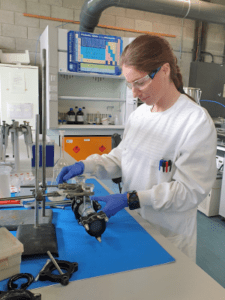
I work in a lab every day setting up equipment, running experiments and analysing results. I am lucky to work closely with two super talented PhD students. We work in the lab together and have many brainstorming sessions and discussions about our projects. During the summer we also work on short-term projects with summer students and interns.
I am also very fortunate to work with my inspiring supervisor who sometimes lets me teach a few classes in chemical engineering. This is a lot of work but I really enjoy it. As well as preparing and delivering the lectures, I also set and mark the exams and help the students with questions. I am still learning so much every day but I really love the teaching process.
I am a member of the Equality Diversity and Inclusion (EDI) Committees within both the UCD School of Chemical and Bioprocess Engineering and BiOrbic. Our goal is to promote EDI within the school/institute. I am also the postdoc representative in the BiOrbic PhD-Postdoc Committee. It can be a large volume of work but I really enjoy getting involved and working with like-minded people.
I also spend a lot of my time at my desk reading the literature and planning future work.
A big part of my day involves planning experiments and therefore contacting suppliers for equipment and chemicals. COVID-19 really slowed down this process and left us waiting for a long time before starting our work. However, things are finally returning to normal and our projects are well underway. I feel very lucky that I got to return to the office quite early in the pandemic due to lab work.
Looking forward to my first Soapbox Science talk, an extra special experience
In BiOrbic, we place a huge emphasis on public engagement and outreach every year. Once I started participating in outreach activities, I discovered that I really enjoyed it. This is my motivation for attending Soapbox Science. Last year I applied and was unsuccessful so this year feels extra special.
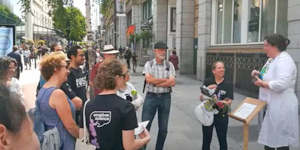
Communicating with lay audiences is a vital part of research and requires lots of practice. It is great to talk to people and it’s encouraging to hear about their interest in science even if they are not scientists themselves. I think our planet’s health is something many people are concerned about and I think it is important that they know good research is being done in this area.
Making plastic from dairy industry ‘waste’
For my Soapbox Science talk, I will discuss converting whey permeate, a typical ‘waste’ from the dairy industry, into lactic acid, which can then be converted into biodegradable plastic. This is done through the process of fermentation using specific lactic acid-producing organisms. This fermentation process can be optimised by continuously producing the lactic acid rather than producing it in many separate batches. The process can be further optimised by retaining the organisms within the system using membranes (very fine filters).
To connect with the audience, I will compare current bioplastics on the market with ordinary plastic. I will explain how more efficient processes can help reduce costs. The UCD Soapbox Science organising team will do a training workshop to help us brush up on our communication skills so hopefully, I will get some more inspiration there too.
Further research into the application of membranes in other areas of the bioplastic production process is needed. Membranes are very versatile and they can be used to solve a wide range of challenges such as gas delivery, separation, dilution and concentration. I believe this is a great opportunity for future work.
Roll up, roll up!
I will be presenting my work with Soapbox Science Dublin on Saturday 18th June 2022 at South King Street in Dublin City Centre. You can also find updates on my Twitter (@sorchaSD) and my department web page.
For a postdoc, it’s difficult to tell what the future holds but I am excited about it. Our planet is facing many challenges but there is so much encouraging research out there. I feel so lucky to be involved in this work and I hope I can stay in it for a long time.

